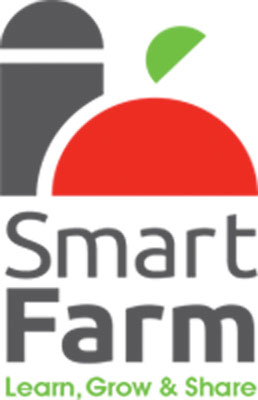About Us
Why We Farm
Smart Farm History:
Smart Farm grew from a frustration with blandness and accessibility. Why were families eating food without color and nutrition? Why didn’t they have access to the fresh food from farms that grew beautiful produce that strengthens and energizes?
In the Midwest, the growing season is short, and produce at most stores has to travel thousands of miles to get there. It is often too expensive for most families to purchase consistently. Something needed to be done — for those with minimal to no access and for those with access but who did not know what to do with the harvest.
One curious community member began reading more about food deserts, the organic movement, and buying local. Kathy Gabelman scouted restaurants that ordered farm-to-table, and studied up on growing her own produce. She decided that she wanted to grow produce and give it to food pantries, which often only accepted canned goods and other non-perishables. If she brought fresh food to them every week, she could bring access to those who currently had none. Gabelman gathered a group of friends, met a master gardener, and began growing in small plots at a community garden space in the Barrington Park District.
As the harvest grew the need for more space was evident. Advocate Good Shepherd Hospital offered land on their campus where Smart Farm began composting food scraps and expanded its farming area. In 2011, Smart Farm added a hoop house to extend its growing season and in 2015 bought a tractor to feed the soil in a still-expanding operation.
Learn more about our history: view video
Smart Farm Today:
By 2022, Smart Farm moved under Advocate Good Shepherd Hospital entirely sparking hospital leadership to determine what the role of the farm would be moving forward. The Leadership team saw a tremendous opportunity to leverage the substantial land the hospital sits on as a way to continue the Gabelman’s mission by identifying 30 acres of hospital land to support this work. The future goal of Smart Farm is to expand the current 2-acre operation to 10 acres in the next 3-5 years aiming to expand entirely to the 30 acres available. With the expertise of the Advocate Good Shepherd farmer and the consultative services of the Rodale Institute, a nonprofit organic farming organization, Advocate Good Shepherd Hospital’s Smart Farm is currently on the expansion journey.
The produce harvested from this expansion will be used to continue to provide fresh produce to our local food pantries, used to support our patients with Chronic Diseases as a teaching tool to create foods that not only taste good but are of high nutritional value, supporting our communities that are experiencing food insecurity and much more! Today Smart Farm grows and donates close to 8 tons or 16,000lbs of produce each year, which equates to about 14,500+ meals. As a hospital we strive to continue making and sharing something that can bring joy and ultimately help people Live Well. While the original work of Smart Farm focused on a small geographic area, the expansion will only enhance the impactful cause the Barrington Community first started of growing bright food for a healthy, sharing community.
Although our work focuses on a small geographic area, its cause is universal and essential: bright food for a healthy, sharing community.
Our Promise
Our Mission
To provide high-quality produce to our communities and those in need who are at risk of food insecurities, while being an educational resource on sustainable gardening and farming practices, healthy eating and strategies to help people Live Well. We will engage patients, community members as well as our clinicians and hospital teammates.
Our Values
- We believe that everyone has the right to healthy food and that a vibrant food system
benefits all community members. - We are committed to serving those in need by growing the most nutritiously dense
food possible. - We recognize our role as stewards of the land.
- We respect the land and actively work to employ practices that restore our soil and
water. - We are dedicated to teaching our community the benefits and practices of sustainable farming.
Fast facts about why we need to grow local
1500 Miles
Average travel distance for food items now consumed in this state
<0.2%
Agricultural products sold directly for human consumption from Illinois farm sales
95%
The amount of organic food sold in Illinois that is grown and processed outside of the state, resulting in food dollars being exported
5th
llinois ranking in the nation in loss of farmland
